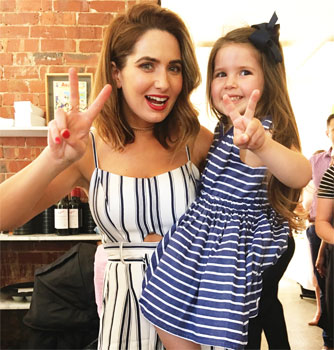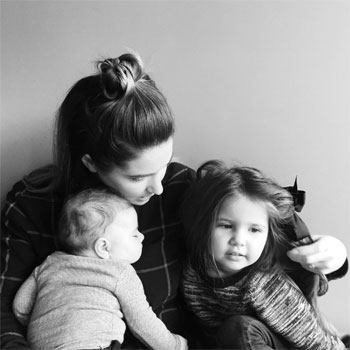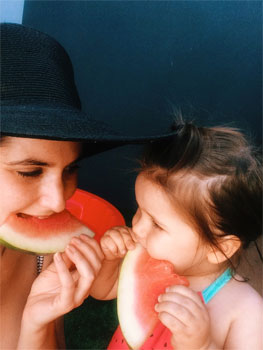Kate Wheatley Working Mum Interview

Kate Wheatley Working Mum Interview
Question: What are the biggest challenges you faced returning to the workforce?
Kate Wheatley: Returning to work at the end of my maternity leave with my second child was a very different experience than with my first, and I faced very different challenges for each. For the first, one of the biggest was learning how to be a logistical magician. It took some time to find a routine that worked for our family, but we got there in the end. And I can't forget the tears – my tears of course, not my daughter's! Every. Single. Day. For a week. I was emotionally overwhelmed – I worried if she'd be well looked after at the child care centre, if she'd be happy, if I'd ever see her, if I'd be able to function at work after sleepless nights, if I'd be so exhausted at the end of the day that I wouldn't be able to give my best to her. Basically I worried if I'd be spreading myself too thinly and only be partly effective in all areas of my life.
The second time around was a lot easier, both emotionally and logistically. I didn't have the same feelings of apprehension – I was looking forward to seeing my son thrive in an environment that could provide him with more stimulation than what I could at home. I was so much more relaxed and positive about the transition. I'd realised that I'm a better mum when I'm working because I feel fulfilled in every aspect of my life and that makes me happy. Quality not quantity, right?
 Question: Why did you decide to re-enter the workforce?
Question: Why did you decide to re-enter the workforce?
Kate Wheatley: For me it was never a question of not re-entering the workforce after maternity leave. Even before I had children I knew I'd continue on with my career. On reflection, pre-children, the reasons for returning to work were more about wanting to feel stimulated and inspired, to earn an income and enjoy a good lifestyle. After I had my daughter, the main reason for returning to the workforce had shifted to be more around setting a good example for her - it's my way of contributing to a movement towards gender equality. The gender pay gap is still prevalent in the corporate world and the gender gap in super savings also concerns me for not only women today, but for the women of the future. Men's super balances at retirement are on average twice as large as women's. I feel like I owe it to my daughter and girls across Australia to do what I can to help them achieve equality and secure comfortable financial futures.
Question: How did you feel giving up your career for a while to focus on the children?
Kate Wheatley: I don't view the breaks I had as giving up my career, rather a career break for a short period to spend time with my newborns. Although both my breaks were relatively short (11 months and 9 months) I still felt apprehensive about taking time out of the workforce. Would my job still be available when I returned? Would there be a monumental shift in the direction of the company I worked for and I'd need to relearn everything? I enjoyed the time I had with my babies, but couldn't help feeling like I was in a limbo zone.
Question: What are the benefits financially and emotionally of working for you?
Kate Wheatley: The financial benefits of working full time are many. In the short term we're able to travel and live a comfortable lifestyle and provide the extras for the children. In the medium term we'll be able to send the children to a school of choice and/or secure tutors, pay off mortgages and hopefully contribute to the children's first house deposits. We'll also be able to contribute additional payments to our super accounts so we can improve the standard of living when we're no longer working.
 Question: What could employers do differently to make it easier for women?
Question: What could employers do differently to make it easier for women?
Kate Wheatley: A good place to start is doing some research to better understand the challenges returning-to-work mothers face both emotionally and logistically. From there, employers would be better placed to develop HR policies that provide support, arrangements and resources to assist with the transition. For example, flexible working arrangements that could involve working from home a certain number of days each week, flexible working hours that enable school/child care drop off and pick up every day or just a few days each week are just some of the ways we could be better supported.
Employers could also provide support and guidance to return-to-work mothers that reaches far beyond their employment tenure – into retirement. Time taken out of the workforce to care for children in particular, and returning to work in a part time or casual capacity means that it has a significant detrimental impact on the balance of our super savings. According to a 2016 Senate Economics References Committee report on the economic security for women in retirement, 90% of Australian women will have inadequate savings to fund a comfortable lifestyle when they're no longer working. That's really worrisome – and no doubt it's a challenge to get people interested enough in a topic to make positive changes when it isn't going to impact them for another 20 or 30 years.
I understand that one super fund, Kinetic Super, completed research last year around people's engagement with super. 45% of working people surveyed only engaged with their super once or not at all during a 12 month period. So super is obviously not top of mind for many, particularly working mothers as we're busy juggling life's commitments today - retirement is such a long way off so there's a distinct -get to it later' attitude. But it's not helping the gender retirement savings gap. So one way employers could assist is by expanding HR policies to include quick ways in which working mothers can make positive changes to their super that will impact their financial futures.
Kinetic Super has information on their website for HR professionals on specific ways working mothers can sort out their super kineticsuper.com.au/returning-to-work.
Kate Wheatley: Returning to work at the end of my maternity leave with my second child was a very different experience than with my first, and I faced very different challenges for each. For the first, one of the biggest was learning how to be a logistical magician. It took some time to find a routine that worked for our family, but we got there in the end. And I can't forget the tears – my tears of course, not my daughter's! Every. Single. Day. For a week. I was emotionally overwhelmed – I worried if she'd be well looked after at the child care centre, if she'd be happy, if I'd ever see her, if I'd be able to function at work after sleepless nights, if I'd be so exhausted at the end of the day that I wouldn't be able to give my best to her. Basically I worried if I'd be spreading myself too thinly and only be partly effective in all areas of my life.
The second time around was a lot easier, both emotionally and logistically. I didn't have the same feelings of apprehension – I was looking forward to seeing my son thrive in an environment that could provide him with more stimulation than what I could at home. I was so much more relaxed and positive about the transition. I'd realised that I'm a better mum when I'm working because I feel fulfilled in every aspect of my life and that makes me happy. Quality not quantity, right?
 Question: Why did you decide to re-enter the workforce?
Question: Why did you decide to re-enter the workforce? Kate Wheatley: For me it was never a question of not re-entering the workforce after maternity leave. Even before I had children I knew I'd continue on with my career. On reflection, pre-children, the reasons for returning to work were more about wanting to feel stimulated and inspired, to earn an income and enjoy a good lifestyle. After I had my daughter, the main reason for returning to the workforce had shifted to be more around setting a good example for her - it's my way of contributing to a movement towards gender equality. The gender pay gap is still prevalent in the corporate world and the gender gap in super savings also concerns me for not only women today, but for the women of the future. Men's super balances at retirement are on average twice as large as women's. I feel like I owe it to my daughter and girls across Australia to do what I can to help them achieve equality and secure comfortable financial futures.
Question: How did you feel giving up your career for a while to focus on the children?
Kate Wheatley: I don't view the breaks I had as giving up my career, rather a career break for a short period to spend time with my newborns. Although both my breaks were relatively short (11 months and 9 months) I still felt apprehensive about taking time out of the workforce. Would my job still be available when I returned? Would there be a monumental shift in the direction of the company I worked for and I'd need to relearn everything? I enjoyed the time I had with my babies, but couldn't help feeling like I was in a limbo zone.
Question: What are the benefits financially and emotionally of working for you?
Kate Wheatley: The financial benefits of working full time are many. In the short term we're able to travel and live a comfortable lifestyle and provide the extras for the children. In the medium term we'll be able to send the children to a school of choice and/or secure tutors, pay off mortgages and hopefully contribute to the children's first house deposits. We'll also be able to contribute additional payments to our super accounts so we can improve the standard of living when we're no longer working.
 Question: What could employers do differently to make it easier for women?
Question: What could employers do differently to make it easier for women? Kate Wheatley: A good place to start is doing some research to better understand the challenges returning-to-work mothers face both emotionally and logistically. From there, employers would be better placed to develop HR policies that provide support, arrangements and resources to assist with the transition. For example, flexible working arrangements that could involve working from home a certain number of days each week, flexible working hours that enable school/child care drop off and pick up every day or just a few days each week are just some of the ways we could be better supported.
Employers could also provide support and guidance to return-to-work mothers that reaches far beyond their employment tenure – into retirement. Time taken out of the workforce to care for children in particular, and returning to work in a part time or casual capacity means that it has a significant detrimental impact on the balance of our super savings. According to a 2016 Senate Economics References Committee report on the economic security for women in retirement, 90% of Australian women will have inadequate savings to fund a comfortable lifestyle when they're no longer working. That's really worrisome – and no doubt it's a challenge to get people interested enough in a topic to make positive changes when it isn't going to impact them for another 20 or 30 years.
I understand that one super fund, Kinetic Super, completed research last year around people's engagement with super. 45% of working people surveyed only engaged with their super once or not at all during a 12 month period. So super is obviously not top of mind for many, particularly working mothers as we're busy juggling life's commitments today - retirement is such a long way off so there's a distinct -get to it later' attitude. But it's not helping the gender retirement savings gap. So one way employers could assist is by expanding HR policies to include quick ways in which working mothers can make positive changes to their super that will impact their financial futures.
Kinetic Super has information on their website for HR professionals on specific ways working mothers can sort out their super kineticsuper.com.au/returning-to-work.
MORE



